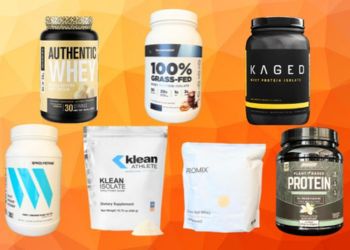Amino acids are the building blocks of life, playing a crucial role in forming proteins, enzymes, and other essential molecules within the human body.
Amino acids are organic compounds that serve as the foundation for protein synthesis in living organisms. They contain an amine group (NH2) and a carboxyl group (COOH), making them unique among biomolecules. But how many different amino acids are there, and what do they all have in common?
Table of Contents
How Do Amino Acids Differ From Each Other?
Amino acids differ significantly based on the distinct properties of their side chains, also known as R-groups.
The side chains contribute to the amino acids’ characteristics, determining their size, shape, charge, and reactivity. These variations give rise to various amino acids with specific roles and functions in biological processes.
For instance, while some amino acids have hydrophobic side chains that repel water and contribute to protein stability, others possess hydrophilic side chains, promoting interactions with water molecules.
Additionally, polar or nonpolar side chains influence how amino acids interact within protein structures, affecting the overall conformation and functionality of the resulting proteins. The diversity in side chain properties underscores the complexity and specificity of amino acids.

The Diversity of Amino Acids: Types and Classification
The human body uses 20 primary amino acids to build proteins. Amino acids can be further classified into essential and nonessential amino acids. Essential amino acids are those the body cannot produce on its own and must be consumed through diet. Nonessential amino acids, on the other hand, can be synthesized by the body.
What are Essential Amino Acids?
Essential amino acids are crucial for various bodily functions, including muscle repair, immune system support, and neurotransmitter synthesis. Understanding the importance of essential amino acids helps incorporate habits that maintain optimal health.
Essential amino acids are a group of amino acids that the human body cannot produce on its own, necessitating their intake through dietary sources. There are nine essential amino acids, each vital in various physiological processes.
These amino acids include:
- Histidine
- Isoleucine
- Leucine
- Lysine
- Methionine
- Phenylalanine
- Threonine
- Tryptophan
- Valine
Since the body cannot synthesize these amino acids, obtaining them from protein-rich foods such as meat, dairy, eggs, legumes, and certain grains is crucial. A balanced and diverse diet is essential to ensure an adequate supply of these amino acids, promoting overall health and well-being.

What Are Nonessential Amino Acids?
Nonessential amino acids are a group of amino acids that the human body can synthesize on its own, eliminating the necessity to obtain them directly from the diet. Unlike essential amino acids, which must be sourced from food, nonessential amino acids can be produced through various biochemical pathways within the body.
These 11 amino acids play a crucial role in supporting overall health, contributing to processes such as protein synthesis, immune function, and the maintenance of various bodily structures. While the body can manufacture these amino acids, their availability can still be influenced by age, health conditions, and dietary patterns.
These amino acids include:
- Alanine
- Arginine
- Asparagine
- Aspartic Acid
- Cysteine
- Glutamic Acid
- Glutamine
- Glycine
- Proline
- Serine
- Tyrosine
What Are Conditional Amino Acids?
Conditional amino acids are a group of amino acids that are generally classified as nonessential because the body can produce them under normal circumstances. However, they become essential under certain conditions, such as illness, stress, or specific health conditions. In these situations, the body may need to synthesize these amino acids sufficiently, necessitating their intake through diet or supplementation.
Examples of conditional amino acids include:
- Arginine
- Cysteine
- Glutamine
- Tyrosine
- Ornithine
- Glycine
- Proline
- Serine
These amino acids play critical roles in various physiological processes, including immune function, antioxidant defense, and collagen synthesis. Understanding the conditional nature of these amino acids underscores their importance in supporting health during challenging circumstances when the body’s demand for specific nutrients increases.

Why Are Amino Acids Important?
Amino acids are crucial for several essential functions in the human body, making them vitally important for overall health and specific health conditions. Here are some key reasons amino acids are indispensable:
Protein Synthesis
Amino acids are the building blocks of proteins. When linked together in specific sequences, they form different types of proteins that serve various functions in the body. Proteins are essential for the structure, function, and regulation of tissues, organs, and cells.
Tissue Repair and Growth
Amino acids play a pivotal role in the repair and growth of tissues. They are significant during periods of development, such as childhood, adolescence, and pregnancy, as well as for the maintenance and repair of tissues in adults.

Enzyme Function
Many enzymes, biological catalysts facilitating chemical reactions, are proteins of amino acids. Enzymes are crucial for numerous biochemical processes, ensuring that responses occur quickly and under the right conditions.
Hormone Production
Amino acids are involved in the synthesis of hormones and neurotransmitters. These signaling molecules regulate physiological processes, including metabolism, mood, and stress response.
Immune System Support
Some amino acids, such as glutamine, support the immune system. They contribute to producing immune cells and antibodies, helping the body defend against infections and diseases.
Energy Production
Certain amino acids can be converted into energy when needed. They serve as a source of energy during periods of fasting, intense physical activity, or when carbohydrates are not readily available.
How to Obtain Amino Acids: Dietary Sources and Supplements
Obtaining amino acids is crucial for maintaining optimal health, and there are various ways to ensure an adequate supply of these essential building blocks.
The primary source of amino acids is through a well-balanced diet that includes protein-rich foods. Foods such as:
- Meat
- Poultry
- Fish
- Eggs
- Dairy products
- Legumes
- Nuts
- Seeds
Consuming various protein-containing foods helps ensure the body receives all the essential amino acids for different physiological functions. Plant-based protein sources like beans, lentils, and tofu can also be combined to achieve a more complete amino acid profile.

For individuals with specific dietary restrictions, increased nutritional needs, or specific fitness goals, amino acid supplements may be considered. However, consulting with a healthcare professional before incorporating supplements into one’s routine is crucial.
Overall, a diverse and balanced diet remains the most effective and natural way to obtain the essential amino acids necessary for maintaining the body’s health and functionality.
Conclusion
In conclusion, amino acids play a significant role in human biology, ranging from protein synthesis to immune support, energy production, and detoxification. Consuming a balanced diet rich in diverse protein sources is the primary means of ensuring an adequate supply.
Dietary supplementation may be considered for those with specific dietary restrictions or increased nutritional needs. However, it is imperative to approach supplementation cautiously, ensuring the selection of high-quality products.
Choosing a reputable supplement brand and discussing supplementation plans with a healthcare provider is essential to address individual needs and potential interactions and prevent adverse effects.
A well-informed approach to obtaining amino acids through a balanced diet and supplementation, guided by professional advice, contributes to optimal health and well-being.
Frequently Asked Question
What is an amino acid (simple definition)?
Amino acids are organic compounds that serve as the basic building blocks of proteins. They consist of an amino group, a carboxyl group, and a unique side chain, and they are essential for various biological functions.
What do amino acids do in the body?
Amino acids play crucial roles in the body, including serving as the building blocks for proteins, contributing to tissue repair and growth, acting as precursors for hormones and neurotransmitters, supporting immune function, and participating in various metabolic processes.
What is the function of amino acids?
The functions of amino acids are diverse and include protein synthesis, enzyme catalysis, support for immune system function, energy production, and maintenance of overall health and well-being.
What are the 5 basic amino acids?
Five basic amino acids include lysine, leucine, isoleucine, valine, and phenylalanine. These amino acids are essential for protein synthesis and various physiological functions.
Which foods have all 9 essential amino acids?
Foods that contain all nine essential amino acids are considered complete proteins. Examples include animal sources such as meat, poultry, fish, eggs, and dairy products. Quinoa and soy are notable plant-based sources providing all essential amino acids.
What are the 7 essential amino acids?
There are nine essential amino acids: histidine, isoleucine, leucine, lysine, methionine, phenylalanine, threonine, tryptophan, and valine. The body cannot synthesize these amino acids, and they must be obtained through the diet.














